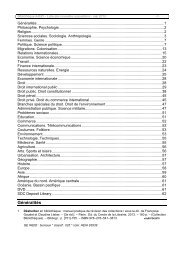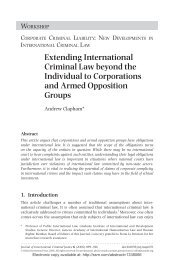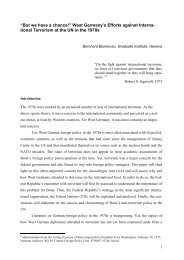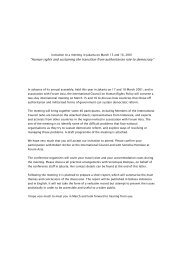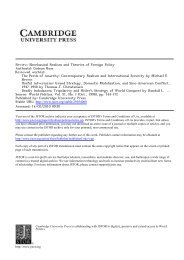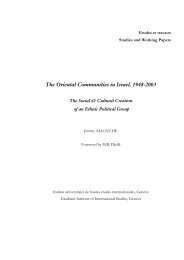Download - The Graduate Institute, Geneva
Download - The Graduate Institute, Geneva
Download - The Graduate Institute, Geneva
You also want an ePaper? Increase the reach of your titles
YUMPU automatically turns print PDFs into web optimized ePapers that Google loves.
general clauses concerning the lawful treatment of deportees, “whilst also allowing<br />
the Government to seek more specific personal assurances depending on individual<br />
circumstances”. 30 More recently, a discussion has been initiated in the framework of<br />
the Council of Europe about the drafting of guidelines concerning diplomatic<br />
assurances. <strong>The</strong> Council decided, however, to reject such an idea, since any other<br />
decision might have been seen as a legitimisation of this controversial practice. 31<br />
<strong>The</strong> informality of diplomatic assurances is not a conclusive factor in the<br />
debate on bindingness. <strong>The</strong> same applies for the nomenclature of an instrument. <strong>The</strong><br />
ILC, for example, suggested in the commentary to its draft articles on the Law of<br />
Treaties that “very many single instruments in daily use, such as “an agreed minute”<br />
or a “memorandum of understanding” could not appropriately be called formal<br />
instruments, but they are undoubtedly international agreements subject to the law of<br />
treaties”, that is binding agreements. 32 In the same vein, the ICJ observed when<br />
dealing with the normative status of a joint communiqué that “it does not settle the<br />
question [of the communiqué’s normative character] simply to refer to the form...in<br />
which that act or transaction is embodied”. 33 In another instance, it declared that<br />
“international agreements may take a number of forms and be given a diversity of<br />
names”. 34 Consequently, one needs to examine other characteristics of diplomatic<br />
assurances to pronounce on their normative status.<br />
As far as the content of diplomatic assurances is concerned, there are two<br />
divergent trends in State practice. Some diplomatic assurances simply reiterate the<br />
international and domestic human rights obligations of the State of return. 35 <strong>The</strong>se<br />
assurances are sometimes presented as an adequate guarantee for reducing the risk<br />
of torture, but many authors suggest that they do not serve the purpose of changing<br />
30<br />
Ninth Report of the Foreign Affairs Committee (House of Commons), 9 July 2008, available at<br />
http://www.parliament.the-stationery-office.co.uk/pa/cm200708/cmselect/cmfaff/533/53302.htm, §65 and<br />
Shah, Naureen, Knocking on the Torturer’s Door: Confronting International Complicity in the U.S. Rendition Program,<br />
38 COLUMBIA HUMAN RIGHTS LAW REVIEW (2007), pp. 581-659, at 631-632. See, however, the particularities of<br />
the case of the arrangement between the United Kingdom and Algeria in 76 BYIL (2005), pp. 672-673, where<br />
assurances were given in an exchange of letters between the Algerian President and the British Prime Minister<br />
supplemented by written arrangements in individual cases.<br />
31<br />
See Final Activity Report of the DH-S-TER on Diplomatic Assurances,, in 62 nd CDDH Report, Council of Europe,<br />
CDDH(2006)007, 4-7 April 2006, §§17 and 20 ; see also the criticisms of Nowak, Manfred and McArthur,<br />
Elizabeth, THE UNITED NATIONS CONVENTION AGAINST TORTURE: A COMMENTARY, 2008, Oxford, Oxford<br />
University Press, at 216; Moeckli, Daniel, op. cit., at 537.<br />
32<br />
[1966] II, ILC YEARBOOK, at 188. See also Article 2 of the Vienna Convention on the Law of Treaties (adopted on<br />
23 May 1969, entered into force on 27 January 1980), 1155 UNTS, pp. 331 et seq., which defines “treaty” as “an<br />
international agreement...whether embodied in a single instrument or in two or more related instruments and<br />
whatever its particular designation”.<br />
33<br />
Aegean Sea Continental Shelf case (Greece v. Turkey) (Preliminary Objections), Judgment of 19 December<br />
1978, ICJ REPORTS (1978), pp. 3 et seq., §96.<br />
34<br />
Maritime Delimitation and Territorial Questions between Qatar and Bahrain case (Qatar v. Bahrain) (Jurisdiction<br />
and Admissibility), Judgment of 1 July 1994, ICJ REPORTS (1994), pp. 112 et seq., §23.<br />
35<br />
See the assurances provided by Uzbekistan in the Mamatkulov case, op. cit., note ??, §28.<br />
7


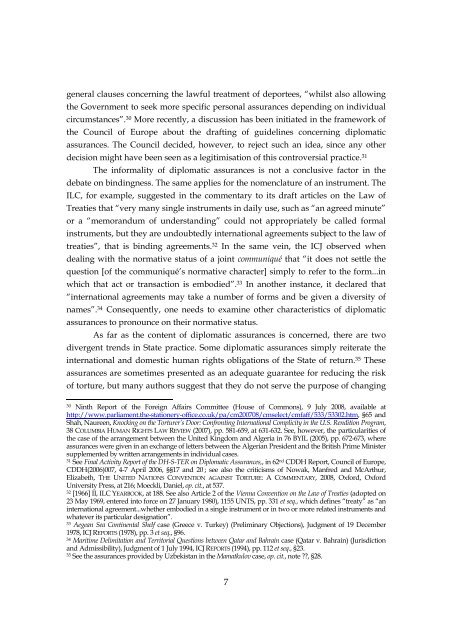
![Download [pdf] - The Graduate Institute, Geneva](https://img.yumpu.com/23370020/1/190x248/download-pdf-the-graduate-institute-geneva.jpg?quality=85)
